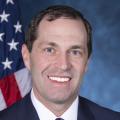Former Colorado Gov. and incumbent U.S. Sen. John Hickenlooper did not take the usual path into public office. After being laid off from his job as a geologist, he opened a successful brewpub. But as a small-business owner, he became involved in his community, and he ran for office. He served two terms each as mayor of Denver and governor of Colorado, using his unique perspective to bring people together to get things done.
When Hickenlooper was sworn in as governor in 2010, Colorado ranked 40th among the states in job creation. By the time Hickenlooper left office eight years later, Colorado had the #1 economy in the nation. Under Hickenlooper, when he was governor, Colorado’s economy grew without leaving Coloradans behind. Hickenlooper expanded Medicaid to cover an additional 400,000 Coloradans and cut the uninsured rate by nearly two-thirds. He signed three landmark gun safety laws in 2013 that banned high-capacity magazines and required background checks for any firearm transfer. On the environment, Hickenlooper made Colorado the first state to limit methane pollution from oil and gas wells. Working with the General Assembly, Hickenlooper signed legislation to ensure every eligible registered voter in Colorado gets a mail-in ballot, made voter registration more accessible, and pushed for numerous other election reforms that have made Colorado a model for election innovation. He also signed historic legislation granting in-state tuition to DREAMers.
Hickenlooper has vowed to improve and build on the Affordable Care Act and supports a federally administered public health coverage option. Hickenlooper recognizes the existential threat of climate change and favors a bold, science-based approach. He supports commonsense policies on gun violence, including restoring an assault weapons ban. Hickenlooper was the first governor of Colorado to apologize for the Sand Creek Massacre and has committed to listening to the voices of marginalized communities and rooting out systemic racism where it lurks in our society, from police brutality to immigration laws to racial disparities in economic status to access to quality education.
Hickenlooper is the progressive voter’s best choice for U.S. senator.
He faces incumbent U.S. Sen. Cory Gardner in this election. While in the Senate, Gardner has been a reliable Republican vote on the overwhelming majority of issues. He has supported Donald Trump’s position on votes 89% of the time, and Politico notes that Gardner is “reliably conservative on most issues.” In 2014, Gardner promised in a campaign ad to speak out when his party is wrong and called on Donald Trump to pull out of the race for president in October of 2016. Since then, however, Gardner has fully embraced Trump and was one of the first senators to endorse Trump’s reelection.
From his earliest votes in Congress, Gardner has consistently sought to repeal the Affordable Care Act. He has voted to repeal the ACA and to replace it with a bill that would dramatically decrease health care coverage and increase the cost of coverage. He was quoted at a private luncheon that failing to repeal the ACA would result in fewer donations to Republicans, suggesting he is not motivated by the common good.
Gardner has rejected most gun safety legislation throughout his career and is a top recipient of donations from the National Rifle Association. He has voted against expanding background checks to include gun show sales, which has been the law in Colorado since just after the Columbine High School shooting in 1999. He even voted against banning gun sales to people on the terrorist watch list.
In a historic change of heart, The Denver Post editorial board declared in 2019 they made a mistake in their 2014 endorsement of Gardner, stating he “has been too busy walking a political tight rope to be a leader.”
This race also has a Libertarian candidate: Raymon Doane. Doane is a Denver native who currently works for the Colorado Department of Revenue as a property tax specialist and business analyst. He previously ran for the state senate in 2016 as a Republican, and in 2018, he first filed to run for state treasurer and then for Congress against Democrat Diana DeGette as a Libertarian.
Doane’s few public statements should give voters pause. While the country has been dealing with the coronavirus outbreak, Doane was quoted as saying, “The federal government should not have to intervene on behalf of local municipalities and states that make poor decisions during a pandemic.” He also has said he thinks public health mandates should be more like “suggestions.” Additionally, among the four policy positions Doane takes on his website, one statement endorsing an unregulated Second Amendment stands out: “The government should NEVER have a monopoly on force. The U.S. Senate must … refuse to vote for any legislation which limits an American’s right to self-defense.” These kinds of statements don’t represent Colorado progressives.
Former Colorado Gov. and incumbent U.S. Sen. John Hickenlooper did not take the usual path into public office. After being laid off from his job as a geologist, he opened a successful brewpub. But as a small-business owner, he became involved in his community, and he ran for office. He served two terms each as mayor of Denver and governor of Colorado, using his unique perspective to bring people together to get things done.
When Hickenlooper was sworn in as governor in 2010, Colorado ranked 40th among the states in job creation. By the time Hickenlooper left office eight years later, Colorado had the #1 economy in the nation. Under Hickenlooper, when he was governor, Colorado’s economy grew without leaving Coloradans behind. Hickenlooper expanded Medicaid to cover an additional 400,000 Coloradans and cut the uninsured rate by nearly two-thirds. He signed three landmark gun safety laws in 2013 that banned high-capacity magazines and required background checks for any firearm transfer. On the environment, Hickenlooper made Colorado the first state to limit methane pollution from oil and gas wells. Working with the General Assembly, Hickenlooper signed legislation to ensure every eligible registered voter in Colorado gets a mail-in ballot, made voter registration more accessible, and pushed for numerous other election reforms that have made Colorado a model for election innovation. He also signed historic legislation granting in-state tuition to DREAMers.
Hickenlooper has vowed to improve and build on the Affordable Care Act and supports a federally administered public health coverage option. Hickenlooper recognizes the existential threat of climate change and favors a bold, science-based approach. He supports commonsense policies on gun violence, including restoring an assault weapons ban. Hickenlooper was the first governor of Colorado to apologize for the Sand Creek Massacre and has committed to listening to the voices of marginalized communities and rooting out systemic racism where it lurks in our society, from police brutality to immigration laws to racial disparities in economic status to access to quality education.
Hickenlooper is the progressive voter’s best choice for U.S. senator.
He faces incumbent U.S. Sen. Cory Gardner in this election. While in the Senate, Gardner has been a reliable Republican vote on the overwhelming majority of issues. He has supported Donald Trump’s position on votes 89% of the time, and Politico notes that Gardner is “reliably conservative on most issues.” In 2014, Gardner promised in a campaign ad to speak out when his party is wrong and called on Donald Trump to pull out of the race for president in October of 2016. Since then, however, Gardner has fully embraced Trump and was one of the first senators to endorse Trump’s reelection.
From his earliest votes in Congress, Gardner has consistently sought to repeal the Affordable Care Act. He has voted to repeal the ACA and to replace it with a bill that would dramatically decrease health care coverage and increase the cost of coverage. He was quoted at a private luncheon that failing to repeal the ACA would result in fewer donations to Republicans, suggesting he is not motivated by the common good.
Gardner has rejected most gun safety legislation throughout his career and is a top recipient of donations from the National Rifle Association. He has voted against expanding background checks to include gun show sales, which has been the law in Colorado since just after the Columbine High School shooting in 1999. He even voted against banning gun sales to people on the terrorist watch list.
In a historic change of heart, The Denver Post editorial board declared in 2019 they made a mistake in their 2014 endorsement of Gardner, stating he “has been too busy walking a political tight rope to be a leader.”
This race also has a Libertarian candidate: Raymon Doane. Doane is a Denver native who currently works for the Colorado Department of Revenue as a property tax specialist and business analyst. He previously ran for the state senate in 2016 as a Republican, and in 2018, he first filed to run for state treasurer and then for Congress against Democrat Diana DeGette as a Libertarian.
Doane’s few public statements should give voters pause. While the country has been dealing with the coronavirus outbreak, Doane was quoted as saying, “The federal government should not have to intervene on behalf of local municipalities and states that make poor decisions during a pandemic.” He also has said he thinks public health mandates should be more like “suggestions.” Additionally, among the four policy positions Doane takes on his website, one statement endorsing an unregulated Second Amendment stands out: “The government should NEVER have a monopoly on force. The U.S. Senate must … refuse to vote for any legislation which limits an American’s right to self-defense.” These kinds of statements don’t represent Colorado progressives.









Progressives are split on Amendment 77, known as the Allow Voters in Central, Black Hawk, and Cripple Creek Cities to Expand Authorized Games and Increase Maximum Bets Initiative. Please read the arguments from both sides below to help you make your decision on this amendment.